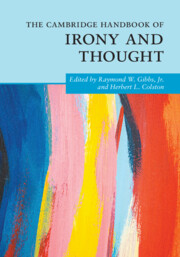Book contents
- The Cambridge Handbook of Irony and Thought
- Cambridge Handbooks in Psychology
- The Cambridge Handbook of Irony and Thought
- Copyright page
- Contents
- Contributors
- Part I Introduction
- Part II The Scope of Irony
- Part III Irony’s Impact
- Part IV Irony in Linguistic Communication
- Part V Irony, Affect, and Related Figures
- Part VI Irony in Expressive, Nonlinguistic Media
- 20 Ironies in Film
- 21 An Ear for Irony
- 22 Pictorial Irony and Sarcasm
- Index
- References
21 - An Ear for Irony
from Part VI - Irony in Expressive, Nonlinguistic Media
Published online by Cambridge University Press: 20 December 2023
- The Cambridge Handbook of Irony and Thought
- Cambridge Handbooks in Psychology
- The Cambridge Handbook of Irony and Thought
- Copyright page
- Contents
- Contributors
- Part I Introduction
- Part II The Scope of Irony
- Part III Irony’s Impact
- Part IV Irony in Linguistic Communication
- Part V Irony, Affect, and Related Figures
- Part VI Irony in Expressive, Nonlinguistic Media
- 20 Ironies in Film
- 21 An Ear for Irony
- 22 Pictorial Irony and Sarcasm
- Index
- References
Summary
This chapter explores the ways irony unfolds in music. Turner and DiBernardo examine representative pop songs, both original compositions and cover versions, to suggest several ways that irony is created and perhaps detected by listeners. As they argue, “Musical irony requires an interpretive ear for hearing contradictory or disjunctive sounds (and lyrics) within a musical context.” But inferring irony from music involves a special challenge given that music lacks it own semantic or representational signification. Lyrics are clearly a driving force in expressing ironic intent, but instrumental sounds often interact with the spoken words to convey richer ironic complexes, including both rhetorical and situational ironies. Listeners may be especially attentive to the tension, or the discrepancy, between the musical form, style, or genre of a song (e.g., the upbeat, lyrical form in Randy Newman’s song “Political Science”) and its lyrical content (e.g., the use of weapons of mass destruction). Many musical ironies may be “post-modern” because of their self-referential style (e.g., not just criticizing others, but ourselves as well). This chapter offers a compelling, beautifully detailed, argument that “music is a largely underexplored wellspring of ironic activity.”
Keywords
- Type
- Chapter
- Information
- The Cambridge Handbook of Irony and Thought , pp. 385 - 401Publisher: Cambridge University PressPrint publication year: 2023



